#this is literally such a niche trope i love but like meeting yourself is like being torn into half
Text
Kiryu would literally hate meeting any alternate version of himself like he spends all his time pretending like his body doesnt exist in the third dimension , if he sees a doppelganger he would be like oh ha ha another copycat and then when he realises no. Thats literally another instance of himself he would get so scared and when he gets scared he gets pissed off and he would be unable to stand this other him
#Yakuza loveblog#this is literally such a niche trope i love but like meeting yourself is like being torn into half#a thousand times worse than looking in the mirror. your skin crawls the more you notice the differences but the worse than those#are the similarities. the way they carry themself mirrors you perfectly#the way they breathe the way they turn their head the faces they make. a perverse imitation of you#i was terrified thinking of doppelgangers the other day they are so ... scary ... dont you think so#how can it be ... i want to perish the thought but i simply cant#anyway im forcing kiryu to meet his clone and then im forcing them to have sex and he would be so angry at this other him#like it would be his first actual hatefuck and he would literally hurt him and be too rough and not stop even when told to <- and then they#will start shoving each other and bristling then throwing punches and then wrestling and spitting thorny words at each other because kiryu#literally doesnt like himself and he can ignore it most days but its impossible when faced with ... yourself
5 notes
·
View notes
Text
What is incredibly telling about myself and people like me who have never been romantically interested in anyone and have never received romantic or heck even platonic love from anyone ever, is not so much the lie we and others tell, that we are “going to meet someone one day” it is actually the concept that we never will. There is a universal experience that we will never have. And before people go off about “self love” there are so many things that you just can’t do alone. You can’t surprise yourself with a gift or a trip because hello duh you know it’s coming because you planned it. I’m all here for treat yourself but there is a major disconnect and a sudden intense pain of deep personal realization and downright loneliness when you see someone else get surprised with flowers or a trip or something tangible and fun they truly weren’t expecting. It’s an element of life that myself and people like me will never experience because we don’t have that rare ability to connect with another human or humans. How wonderful it would be to share fun times and gifts and trips with someone and just feel like you belong somewhere and that your life has meaning because you are able to connect with someone on a deep personal level that allows for safety and desire and vulnerability. And so much of why I feel like I can’t connect is by painful design (horrible genetics, physically, and emotionally unattractive, mentally unstable via depression, weird niche interests no one in the world will be able to tolerate, personality of a cardboard box etc) Most of the time, the feeling of hopelessness is manageable but sometimes, the idea that I will never be loved, wanted, desired, needed, surprised by anyone or anything ever, is soul crushing and a literal punch in the gut. And somehow, at the same time, we’ve all universally accepted that this is how it’s meant to be. So we cringe and roll our eyes at these corny romantic tropes and shit on supposed happy couples because it’s the only thing coping mechanism we have left.
#personal#romance#psychology#sociology#love#depression#time is not on my side#and not in my favor#30 years old with no love experience#yeah what a catch#and how do you even trust that people won’t murder you
3 notes
·
View notes
Text
I’ve talked before about how Nadia being Earthborn is the central reason she’s renegade leaning, but I really want to get into it again because I’ve been listening to Hadestown a lot recently and that always makes me think of Nadia because the musical touches on how traumatizing poverty is. And also just because, well, I always want to talk about Nadia.
But before I can do that, I have to talk about a few other things first.
(This is going to be niche and also super self-indulgent, but it’s my blog, so who cares. Note that because of what both Hadestown and the Earthborn background entail, this is going to get slightly political. But again, it’s my blog, so who cares.)
Generally speaking, Mass Effect has an issue with downplaying trauma. Ashley, Tali, Garrus, and James all go through the traumatic experience of being sole (or almost sole) survivors. Tali goes through this twice, because the comics show that before she even met Shepard she lost the team she’d been traveling with. (And that’s not even counting the fact she also loses a chunk of her team on Freedom’s Progress. They use this trope with her a lot.) Liara loses her mother in the first game and she has almost no reaction. Shepard dies in the beginning of the second game and spends the rest joking about it, with very few opportunities to express anything but humor over the situation.
People respond to trauma differently, and the game is also told primarily from Shepard’s point of view, so consequently we only see what Shepard sees. All of these characters likely grieved in private, and they definitely do carry scars (literal and figurative) from what they’ve gone through. But I also think that Mass Effect likes making characters go through objectively traumatic things without fully considering how someone might act coming out of it. In fairness, that’s the fun of fanfic, and I also do think everyone on the Normandy has some degree of experience in compartmentalizing because they simply don’t have the time to sit down with their feelings. (A lot of them are also just averse to doing this.)
But exploring that trauma is what I’m interested in the most, and that’s how I approached Nadia. Earthborn is my favorite background for that reason. It’s not a single event that’s shaped their life thereafter, but a sustained stressful environment they endure for years and only escape once they sign up with the Alliance. And in that regard, Nadia rather sees it as trading one cage for another, but that’s neither here nor there.
Like, to go back to Hadestown (I swear I’m not going to write Hadestown meta on this blog), “When the Chips are Down” is one of my favorite numbers because it so accurately describes Nadia’s response to poverty. “How can you expect me to care about another person and put their wellbeing above my own, when doing that will result in my own death? How can you expect me to trust another person, when that could result in my own death? How are you going to lecture me on having no morals when if I had prioritized morality, I never would have survived?” (This is something I love bouncing off Kaidan, but I’ll get to that later.)
In other words, and this is an incredibly obvious thing to say, poverty is traumatizing and violent. It is an incredibly violent thing to put another human being through, to make them worry for their basic safety, to live their day to day in a constant limbo of uncertainty that permeates every facet of their life. Will you be able to eat today? Will you be able to sleep in a safe environment? Can you trust this person you’ve never met? Will trusting them endanger what little safety you’ve managed to achieve? How much money do you have? How long can you make that money last? Where will you be tomorrow? How about the day after?
This is something that leaves its mark on anyone it touches. It’s hard enough for an adult to plan for the future when they don’t have the luxury of knowing how they’ll even survive the week; when you’re a child, and that sort of stress is all that you’ve known, how do you even imagine a better life when you’ve known nothing different?
Before I get any further, I want to pause for a moment. Something that’s always been curious to me are the codex entries for Earth. Here’s a portion of ME1′s codex:

Here’s a portion of ME3′s codex:
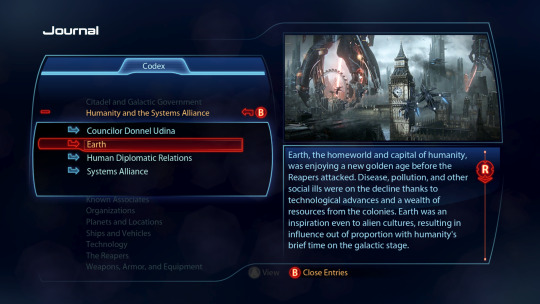
(Written transcripts of the complete codex entries at the links.)
In both of them, they talk about how humanity is in a new golden age. A lot of pollution and common diseases have been eliminated. The colonies have brought in more resources. There's even been some correction to the damage early climate change caused. Then the Fire Nation—I mean, Reapers, attacked and ruined all of this. Except, take a closer look at ME1′s codex:
“While every human enjoys longer and better life than ever, the gap between rich and poor widens daily. [...] Less fortunate regions have not progressed beyond 20th century technology, and are often smog-choked, overpopulated slums.”
This seems incompatible with the idea of Earth being in a golden age. How can Earth be thriving if the class disparity is growing, not narrowing? How can Earth be thriving if entire swaths are still "smog-choked” and using centuries old outdated technology?
It’s not incompatible if the idea is that Earth has entered a golden age only for the ones who can afford it. And this is the reality Earthborn Shepards were raised in: the idea that their suffering is an unimportant, insignificant underbelly to an otherwise “prospering” homeworld.
So, resuming with that in mind: the way Nadia sees it is that to allow poverty to exist is an inherent societal failure that reflects on the government. This is why Nadia has no loyalty to the Alliance, and why she doesn’t trust them. This is why she subsequently has no loyalty to the Council, and why she doesn’t trust them, either. It doesn’t matter that the Alliance and the Council weren’t personally responsible for her childhood, because they’re still governments. She knows that governments will lie and exploit and allow for people like her to fall through the cracks if it will benefit them. She knows they will broadcast only the best of what they have to offer while conveniently pretending people like her don’t exist.
Like, personal politics aside, as shown above with the codex entries, this is just...canon. And Thane’s loyalty highlights poverty on the Citadel through Mouse and the concept of “duct rats,” so we know that it exists there, too. How the Council presumably feels about poverty on their station is outlined if you speak to Avina on the Citadel in the second game:


AVINA: Asari futurists believe poverty cannot be eliminated without “cornucopia” technology, which will create anything the user desires. Such technology is unknown outside science fiction.
Essentially: yeah, unfortunately, poverty exists on the station, but what can you do? Believing poverty is avoidable is actually utopian and therefore unrealistic, sorry!
But when you meet Anoleis on Noveria as Earthborn, he can literally tell you poverty doesn’t exist on Sur’Kesh. (And sure, he could be lying, and we have no proof either way. It doesn’t erase the fact that, at the very least, the existence of widespread poverty is something that even a corrupt and money embezzling salarian thinks is an easy jab.)

ANOLEIS: My homeworld is clean. Poverty is non-existent. If you take some perverse pride in that overheated, acid-washed slum, that is your business.
There’s nothing about the Alliance and poverty that I know of¹, which makes sense considering the main branch of the Alliance we see throughout the games is its military branch. There are still plenty of instances in the trilogy where the Alliance does exploit the vulnerable, or attempts to cover up their self-inflicted shortcomings. An obvious one is with Kaidan and Conatix; Kaidan literally tells you the Alliance is the one who “made mistakes.” That in their haste, they allowed a man to brutalize children for the sake of research. And when it backfired, they sealed the documents and pretended it never happened.
UNC: The Negotiation is one of my favorite ME1 missions for this reason, too—it highlights a part of the Alliance the series doesn’t really focus on otherwise. Darius tells you that the entire reason he’s operating in the region at all is because the Alliance is the one who set him up there.


DARIUS: You see this gun? This is your gun. Your military set me up here, and now it wants to pretend it doesn’t know me! But I know the truth. The Alliance needed me here! So treat me with the respect I deserve!
SHEPARD: You said we set you up. Did the Alliance give you weapons?
DARIUS: After the batarians were driven out of the Verge, the Alliance wanted to stabilize the region. I had the strongest syndicate in the area. They gave me the weapons and money I needed to take over.
After the mission, Hackett implies the entire reason he sent renegade Shepard to cover a diplomatic negotiation is because he expected and wanted them to kill Darius, because he was now more trouble than he was worth.
HACKETT: I’m sorry that you were unable to negotiate with Darius peacefully. His death is regrettable. Nevertheless, the resulting chaos will create a power vacuum that makes future raids upon our miners unlikely.
SHEPARD: You didn’t think I’d negotiate with him. You wanted me to kill him.
HACKETT: Sometimes extreme measures must be taken to ensure humanity’s safety. Or did you think you were the only one willing to break the rules to get the job done?
(Link, so you can watch the mission yourself.)
None of this is me saying the Council and the Alliance have no redeemable features whatsoever, or that they have never contributed positively to galactic wellbeing. It’s just me citing instances in canon that support why Nadia has the opinion she does of them, and why she’s not exactly incorrect in having them.
So, to loop this back around to Kaidan? As I said, he’s not a stranger to government-level negligence. But Kaidan had a much different reaction than Nadia did, and this is something that absolutely fascinates her once she finds out.
Before that, though: the two of them don’t really hit it off in the beginning—though they’re both still professional—and this is mainly due to Nadia being, well, Nadia. She is not a people person and she never tries to be, which consequently makes her off-putting to most people. On her end, she’s generally unimpressed and uninterested in the people around her. She sees a lot of them as puzzles to be solved and then to move on from, or threats to assess.² The rare times someone does pique her interest enough to act on it, she still prefers to not linger around for long. So, you know, just general unhealthy behavior.
So, Eden Prime is illuminating for them both. Like, on Kaidan’s end: Nadia comes off as callous. She doesn’t care about the colonists, she doesn’t care about Jenkins’ death. On Nadia’s end: Kaidan comes off as naive. How has he been a marine for this long and she has to tell him to suck it up after someone dies? (This is one of the reasons why she didn’t want to work with regular marines again; in my canon, Anderson had to needle her³ into accepting the Normandy position.)
But the truth of it is that the reason Nadia comes off as callous is because she’s thoroughly desensitized. Like, when you grow up poor, on the streets, and in a gang? You’re both witnessing and being put through a lot of traumatizing situations. Akuze, of course, only adds onto this. There’s this one dialogue option in the beginning of the second game when Miranda and Jacob are assessing Shepard’s memory, and while Nadia doesn’t take this option in canon, it is how she feels:
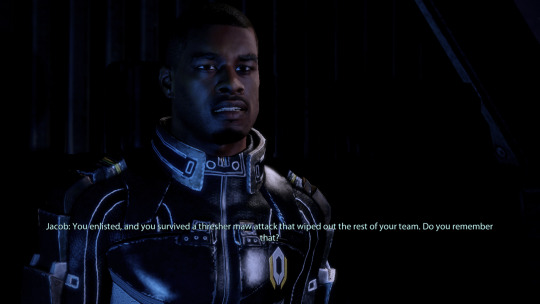
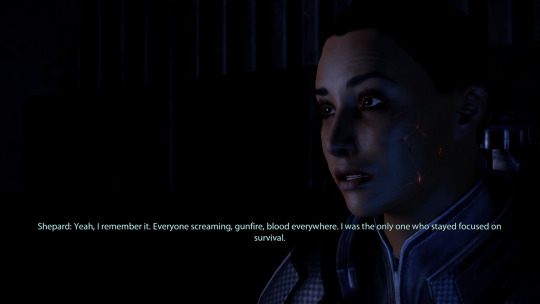
JACOB: You enlisted, and you survived a thresher maw attack that wiped out the rest of your team. Do you remember that?
SHEPARD: Yeah, I remember it. Everyone screaming, gunfire, blood everywhere. I was the only one focused on survival.
Paragon Shepard focuses entirely on the other marines: how they were their friends, how something like that can destroy you if you let it.
Renegade Shepard barely thinks of anyone else at all. There were fifty other marines on Akuze, and renegade Shepard thinks they survived simply because they were the only one focused on it. For Nadia, that’s because that’s what her entire life has already been until that point.
Look, there are a lot of different ways to play renegade; it runs a much larger gamut than paragon, in my opinion. Nadia is more of a neutral renegade. She’s not particularly bigoted, just dispassionate and apathetic⁴. She resorts to violence and intimidation because it’s the easiest way to control her surroundings, not because she thinks what she’s doing is particularly righteous⁵. This can get brought up in Samara’s loyalty when talking with Morinth:

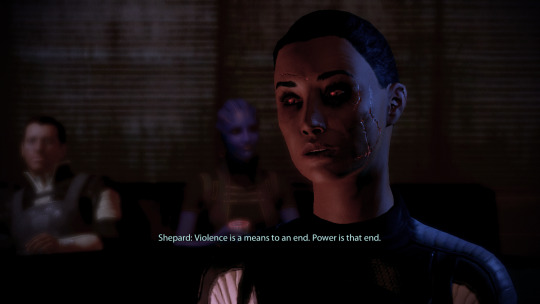
MORINTH: Violence is the surest expression of power.
SHEPARD: Violence is a means to an end. Power is that end.
Like, Nadia is a person who’s had to live a life surrounded by violence, not because it’s what she initially chose, but because it was repeatedly inflicted on her. She didn’t have the luxury of nursing her compassion and generosity, or of prioritizing morality. Those things would’ve gotten her killed. What she focused on instead was survival: the best way to survive, the easiest way to survive, the way that consistently ensured her own safety. This meant violence, and in order to survive, she became very good at inflicting violence.
That’s what I meant when I said Nadia thinks she traded one cage for another: the Alliance wasn’t freedom in the truest sense; she’s still doing what she ultimately would’ve done if she had remained with the Reds⁶. She’s just doing it with government approval and a steadier paycheck. She knows she’s still being used, and it’s only who’s using her that’s changed. All that’s to say, she isn’t an N7 ranked infiltrator because she feels strongly about protecting Alliance space and dirtying her hands to do it. She’s an N7 ranked infiltrator because it’s simply what she’s good at.
One of my favorite renegade lines in the entire trilogy is during Thane’s loyalty because it perfectly highlights Nadia’s philosophy on her situation:

SHEPARD: Your father and I have killed a lot of people. You haven’t. There’s no reason you should start.
To Nadia, her life is what it is because of the circumstances she was raised in and the decisions she made in response to that. She doesn’t deflect blame for the sort of person she’s become; she holds herself the correct amount of responsible.
She kills people for the Alliance, she kills people for the Council, she kills people for Cerberus. Other Shepards might dress it up differently when death is unavoidable: “it’s a shame, but it was necessary,” said along with the appropriate amount of guilt. Or: they were a terrorist, they were a mercenary, they forced my hand. To Nadia, it’s all death, and there’s no inherent difference between killing someone “to protect humanity” (read: protect the Alliance’s interests) or killing someone “to protect the galaxy” (read: protect the Council’s interests) and simply killing someone in a situation paragon Shepards would deem unnecessary. And to Nadia, if you haven’t had to live a life like this—why start? You still have other options. Use them.
One thing I love about Hadestown is how it discusses the simple accessibility of being able to live your life, let alone live it virtuously. Like whether or not I agree with that, it’s an interesting thing to explore, and it gets brought up multiple times:
“When you’re hungry and there ain’t enough to go round / ain’t no length to which a girl won’t go / [...] and sometimes you think / you would do anything / just to fill your belly full of food”
“See how the vipers and vultures surround you / and they’ll take you down, they’ll pick you clean / if you stick around such a desperate scene / see, people get mean when the chips are down”
“Aim for the heart / shoot to kill / if you don’t do it, then the other one will / [...] nobody’s righteous / nobody’s proud / nobody’s innocent / now that the chips are down”
“Go ahead and lay the blame / talk of virtue / talk of sin / wouldn’t you have done the same? / in her shoes / in her skin / you can have your principles when you’ve got a belly full”
“I did what I had to do / that’s what they did too”
“Some flowers bloom / where the green grass grows / our praise is not for them / but the ones who bloom in the bitter snow”
Again, I’m not going to meta about Hadestown⁷ and the precise context for these verses are different in that canon (for starters, Eurydice never kills anyone), but the concept is similar: when you’re poor, you’re often driven to desperate measures to survive. Sometimes that means stepping over other people, or otherwise ignoring how your actions will affect them. Often, this is to your own detriment. And it’s really, really easy to cast judgment on the poor people driven to these decisions when you were never in their position. It’s really easy to just live when you’re not in a situation where you had to worry about your survival on a day-by-day basis.
I bring up Hadestown because it’s a nice conduit to explain Nadia’s issues. She’s not renegade because she thinks she’s on a crusade and anyone who gets in her way is acceptable collateral damage. She’s renegade because her survival depended on it, and as Sha’ira points out, it’s what has allowed her continual survival:
“I see your skin, tough as the scales of any turian. Unyielding. A wall between you and everyone else. But it protects you, makes you strong. That strength is what kept you alive when everyone else around you was dying. You alone survived. You will continue to survive.”
For her to survive her childhood, she had to step over other people and put herself first. This meant not allowing herself to get close to other people, and to not care about them beyond what they can give her to ensure her own survival.
And this is why Kaidan interests her. Kaidan’s response to brain camp wasn’t to minimize the importance of his morality, it was to double down on it. (Yes, partially to his own detriment, but that’s a different post.) His response wasn’t to distrust others, because after all, one of his defining characteristics is his compassion. It’s just that Kaidan’s inclined to troubleshoot everything, even his interactions with other people. He might be “once burned, twice shy” but he’s not going to be “once burned, byedon’tfollowmeI’mgoingtorelyonlyonmyselfforever.”
Like, he still wants to help...
SHEPARD: So why are you telling me this? Are you saying I’m cutting corners somewhere?
KAIDAN: I’m saying...it’s probably inevitable that we’ll have to. And when that happens, I want to help you. When someone important to you is up on a ledge, you help them. Keep them from mistakes better made by a kid.
SHEPARD: I’m a big girl, Alenko. I don’t need your help.
KAIDAN: I didn’t say you needed it, I said I’m offering it.⁸
...even though his desire to help (because he cares, because he thinks it’s the right thing to do) is precisely what led to the culmination of his trauma.
KAIDAN: He hurt Rahna. Broke her arm. She reached for a glass of water instead of pulling it biotically. She just wanted a drink without getting a nosebleed, you know? Like an idiot, I stood up. Didn’t know what I was gonna do...just, something.
He figures out what went wrong and tries to avoid repeating that mistake. He doesn’t just stop trying at all. He doesn’t lose his faith in having faith.
It’s antithetical to how Nadia responded to her own circumstances, and she can’t quite process the logic behind...why you would be this way. It’s not that she expects everyone to be like her. She’s seen a lot of different people traumatized, and consequently a lot of different ways people have reacted to trauma. It’s more like: “fool me once” is enough for Nadia. There are no second chances after that. She sees no point in ruminating over why something went wrong. Just accept that it did. (Or don’t, but never think about it, anyway.) She thinks living any other way is akin to, I don’t know, laying down in a snake pit right after one just bit you. Stupid, in other words.
(I should also clarify: this is mainly when it concerns people. She will troubleshoot when it comes to things like tech.)
Like, I’ve joked about this to a friend, but when Nadia first reads Kaidan’s file⁹ her impression is: alright, boy scout. Then she actually meets him and she thinks her assessment was more or less spot on, and she loses whatever vestiges of interest his file did manage to leave despite its otherwise boy-scouty-ness.
But the thing is, Kaidan isn’t naive. He chooses to have the faith he has in the Alliance despite what they’ve put him through. He’s acutely aware that the Alliance is capable of mistakes, because he’s been on the receiving end of it—yet he still wants to help and feels that as a biotic, the Alliance is his best avenue to do that:
KAIDAN: I’m not looking for “the dream.” I just want to do some good. See what’s out here.
KAIDAN: Commander, I thought real hard about how to use my talents. When I swore the oath to defend the Alliance, it wasn’t on a whim.
Like, Nadia thinks Kaidan giving his loyalty to the Alliance is a stupid reaction, yes (in fairness, Nadia thinks loyalty to organizations in general is stupid), but it still fascinates her precisely because Kaidan has some semblance of an idea of what the Alliance’s negligence can and has caused, and yet he still continues to put his faith in them. Kaidan hasn’t had the easiest life¹⁰, but instead of closing himself off, his reaction was to give the Alliance a second chance, to still place his faith in others, all because he still wanted to do some good.
It’s not what Nadia has done, and she can’t say she understands it, but realizing that Kaidan isn’t the ignorant boy scout she pegged him as goes a long way when it comes to the development of their relationship. (For instance: it allows the relationship to develop at all, lmao.) And the development of their relationship is one of the early domino pieces in a long line of dominoes that sets Nadia down a much healthier path.¹¹
~
¹ We do know, however, that the Alliance does offer to pay college/university tuition in exchange for serving with them in some capacity, thanks to conversations with Traynor and Ashley.
² You know that one Iron Bull banter with Cole where he talks about how one of the first things he does when he meets a new person is to figure out the best way to kill them? Yeah, that’s Nadia.
³ This is because Anderson’s brain is huge, and he understood no one can forever live life the way Nadia was living hers unless they’re a death seeker.
⁴ One of the most in character renegade lines in the trilogy is, once again, during Thane’s loyalty (a big reason why it’s one of my favorites: it’s really, really good Nadia content) when you choose the first renegade check during the interrogation. Shepard sounds so bored, so matter-of-fact. That’s the kind of renegade Nadia is.
⁵ This is probably worse to some people compared to “hard” renegade, since at least “hard” renegade can genuinely believe in what they’re doing, even if others consider it evil. Fortunately, I don’t care.
⁶ I don’t really think she killed anyone during her time with the Reds. (Or, if she did, it was only one person and it would’ve been near the end of her time with them.) I think they primarily used her for cybercrime. She still would’ve witnessed and been expected to participate in a lot of beatings, etc. And, as previously said, had she stayed with the Reds I do think this would’ve ultimately progressed into her killing for them, too.
⁷ Though if you enjoy criticisms of capitalism, an exploration into the traumatizing effects of poverty, and an ultimately hopeful message that meaningful change is possible even when everyone is conditioned to believe it’s not, I recommend giving it a listen. It’s easy to follow along through audio alone, but you can find a low quality bootleg pretty easily, too. (Be warned that some of the songs will differ from the official album recording, though.)
⁸ If the remaster brings better lighting to Kaidan’s little hub area and doesn’t hideously whitewash him like in ME3, this is absolutely one of the first things I’m going to gif because it’s one of my favorite moments in the entire romance.
⁹ Nadia reads the files of everyone she’s going to work with, not because she’s particularly interested in them, but because she wants to know what level of incompetency to expect.
¹⁰ Unrelatedly: ask me about my headcanon about how disgustingly rich Kaidan’s family is, and how much Nadia wants to kill him when she finds this out.
¹¹ This is absolutely not saying love, romantic or otherwise, cures her lifetime worth of unpacked trauma.
#ch: nadia shepard#this post brought to you by: my very desperate need#not to look at the fic i've been trying to work on all month#this post also brought to you by: my obsession with nadia and hadestown overlapping#this post also-also brought to you by: my desire to simply talk about hadestown#and finally#this post also-also-also brought to you by:#my desire to regain the ability to string sentences together again#(see point 1)#i'm going to go farm balloons in acnh now
9 notes
·
View notes
Text
annual writing self-evaluation
All answers should be about works published in 2018.
tagged by: N O B O D Y, i’m the one getting the party started this year 😎i’m going to tag every writer i follow, so please feel free to fill this out for yourself without feeling obligated to read my answers if you’re not into it!
i. Optional if applicable: link to last year’s self evaluation:
2017!
1. List of works published this year (in the order that they were posted):
tonight make me unstoppable
turn to dust or to gold
spring cleaning
since we’re alone
this modern love
i still remember
the gentlest feeling
think i’m gonna win this time
nothing but dreams inside
sending postcards to myself
dust to dust
lullaby for the new world order
gold dust in our hands
#ship 1d with superheroes 2k18
cloud on my tongue
sing it one last time
(unpublished winterhawk fic that will be arriving next weekend)
2. Work you are most proud of (and why):
hmmmm. i mean, if you count the luckyverse as a whole as one work, then obviously that. i’ve put a lot of time and thought into developing this relationship and finding ways to progress it over the course of several years and trying to justify why we are examining their relationship at the specific times that the stories take place. it’s the hardest i’ve worked on anything, it’s the most time i’ve spent on one idea, it’s the longest thing i’ve ever created, it’s the most i’ve ever enjoyed writing, and it’s gotten the most satisfying response. it’s not the most popular thing i’ve ever done, and i know there will be fewer and fewer people showing up for each successive part, but the people who support this have been just...the most generous and wonderful, and creating this thing has been such a rewarding experience for me.
3. Work you are least proud of (and why):
nope, this year i’m pretty proud of everything 🙃
4. A favorite excerpt of your writing:
from this modern love:
“Buck,” Louis says, and he’s looking at Bucky so openly, gazing at him so adoringly, and his fingertips are so gentle against Bucky’s face. He isn’t holding anything back, and it’s one of those moments where Bucky almost steps out of his own head and sees himself from a distance, and he has to tell himself, this is your life, you get to have this now.
“It was a nice day,” Bucky says instead. “I’m really glad I got to be a part of it.”
“You’re going to be a part of everything from now on,” Louis says, tracing the arch of Bucky’s eyebrow with his thumb. “Shit, I can’t stop touching you.”
“Don’t stop touching me,” Bucky says. His hands are on Louis’ hips, anchoring him in place, and they feel hot where they meet Louis’ clothing. His right palm is sweating, and his left is crackling with the anticipation.
There are two categories of energy. There’s kinetic energy, the energy of motion. The energy of Bucky reaching through space and time against all the odds to meet this man, to run after him down the street, to touch his body and kiss his sacred mouth.
And the other category is potential energy, the energy that is stored up and kept secure for the future when you’re ready for it. The energy of possibility, the energy that hasn’t done anything yet but promises you maybe, maybe, maybe.
5. Share or describe a favorite comment you received:
i got a lot of comments along the lines of ‘i didn’t expect this to work, but it did,’ which always brings me joy. i reread @queerlyalex‘s comment on nothing but dreams inside whenever i’m feeling :/ about myself and my writing. all seven comments on cloud on my tongue are so precious to me because i loved writing that one so, so much, it was my love letter to lucky and how far they’ve come. i really just treasure the people who are still hanging in there and reading about my precious weirdos and really picking up on all the things i was trying to do with that story.
6. A time when writing was really, really hard:
any time i have to write a scene with more than two characters is a struggle. the absolute worst ones this year were freddie’s birthday party and bucky and louis’ dinner party. just the worst. more than two characters is too many to keep track of.
7. A scene or character that you wrote that surprised you:
genuinely everything. at the end of last year, i was planning to write one (1) lucky fic for rarepair fest, and i was planning to write trans spiderlou, and that was it. and instead, this turned in the year of lucky, the #ship 1d with superheroes 2k18 that i was not expecting.
8. How did you grow as a writer this year:
last year, i was very focused on being a more minimalist writer, on ignoring plot and just writing the parts that i found interesting, just quick projects in one sitting for as long as they held my interest. this year, i spent more time stretching out inside a scene, just settling in and letting it take as long as it needed to take. i learned how to sustain my own interest in an idea for longer than a few hours. it used to be that if i didn’t finish something in one sitting, i didn’t finish it at all. meanwhile, i can’t even tell you how many sittings i’ve spent on lucky over the last year, and i’m still excited about it and invested in it. i wouldn’t say that i appreciate the concept of plot much more than i used to -- i’m still much more focused on small moments of character interaction. but i’ve learned to embrace the concept of outlining in order to make sure i cover everything i want to cover, and i’m not so afraid of the passage of time anymore.
9. How do you hope to grow next year:
this is my answer from last year:
i would like to try some new pairings. this is weird, but i’ve never really written a true nouis story? it feels like i should have, but i haven’t, and that’s something i wouldn’t mind tackling next year. also, when i first started out, i didn’t feel comfortable leaving canon behind because i worried that i didn’t have a strong enough grip on my characters yet, and i feared that if i started writing AUs or whatever, my characters would become unrecognizable. but i’d like to keep venturing out and trying new worlds and tropes. i want to write more trans characters. i’d like to write an ace fic. i’d like to bring my eye to things i haven’t written before and see what happens.
things i did this year: tried new pairings, wrote a true nouis story, wrote AUs, wrote more trans characters. and although it’s not explicitly identified in the story, bucky is demi in luckyverse, so i guess you could say i wrote an ace fic. so...i’m pretty pleased with all that.
‘i’d like to bring my eye to things i haven’t written before and see what happens’ is always going to be my writing mantra, i think. this year was very heavily focused on lucky, so i think i’d like to write more diversely next year, focusing on other stuff as well. i’d like to write more marvel stories, and i’d like to play around with winterhawk more and maybe find my own preferred niche inside that particular pairing. i just want to keep pushing myself and trying new things.
10. Who was your greatest positive influence this year as a writer (could be another writer or beta or cheerleader or muse etc etc):
i will say that @dearmrsawyer really stepped up and became my absolute mvp this year. jamila is the best for pure brainstorming, for just coming up with an idle idea and running with it until it’s something huge and important and vital to whatever project i’m working on. there is very little i wrote this year that she didn’t have a hand in to some extent. @nightwideopen was absolutely lucky’s #1 cheerleader, which means so much to me. @queerlyalex is always the best in terms of pure positivity and encouragement, about writing, about not writing, about life, about everything. @fleetwooded has been such a perfect beta for me, someone i absolutely trust to tell me the truth about whether or not something works, someone who is so thoughtful with comments and ideas, someone whose eye i 100% trust. @sarcathlon made me art!!!! holy shit, i’m never going to be over it, genuinely the nicest and most supportive compliment ever. and of course, bucky barnes has my entire heart and i’m never gonna stop yelling about how he is a good boy trying his best.
11. Anything in your real life show up in your writing this year:
uh, yes. lol. all of bucky’s anatomical awareness is a result of my stupid useless anatomy degree. at least i finally got to use it for something!! a lot of bucky’s anxiety and panic is based on my own. bucky’s hatred and fear of grocery stores is literally me.
12. Any new wisdom you can share with other writers:
i’m always going to say to write the stories that you want to write, and fuck all the writing rules that tell you there’s a specific way to tell a story. tell it your way. have fun. writing is pointless if you don’t genuinely enjoy it, because we aren’t getting paid for this, and most of us aren’t going to write things that are wildly popular, so the joy has to come from the creation of it. if you expect the joy to come entirely from other people’s responses to your work, you’re going to be disappointed. if you love what you write, then you are guaranteed that at least one person is going to love what you wrote. that’s all i got.
13. Any new projects you’re looking forward to starting (or finishing) in the new year:
we’ve got two (or three 😩) more parts of the luckyverse in the wings, and i want to write my zayn character study. everything else is up for grabs.
14. Tag three writers/artists whose answers you’d like to read:
listen, i’m tagging e v e r y o n e who i think wrote something this year because i wanna get this thing going again. so please, if i accidentally skipped you, or if you are someone i don’t follow who is reading this and you want to do it, please feel free, just say i tagged you.
@magicalrocketships @veryniceandgood @bigbrotherlouis @secretspeller @ferryboatpeak @zaptains @jiksax @mildlymaddy @dearmrsawyer @saysthemagpie @polaroidgirlfriend @clarz @imlouisaf @queerlyalex @nothanksweregood @musingsofmaura @niallspringsteen @foliealou @tintedglasses @sarcathlon @nocontrolforlouis @fleetwooded @nightwideopen @captn-sara-holmes @flawedamythyst @akai-coat @claraxbarton @kangofu-cb
#me me me#long post#writing#year in review#goodbye 2018#it's hilarious how long this takes to do when no one is going to read it but it was nice to organize my own thoughts about the year i had
35 notes
·
View notes
Text
Top 10 Films of 2018 (So Far)
Since I quite like continuing old traditions, I wanted to do a post rounding up what I consider to be the ten best films of 2018 so far. This list includes a few films that came out in 2017 in the US, since they were only released here in the UK this year.
Have you seen any of the films I cover below? Have I piqued your interest in a title you might not have heard before? Let me know, and do share your favourites too!
1. Annihilation, dir. Alex Garland
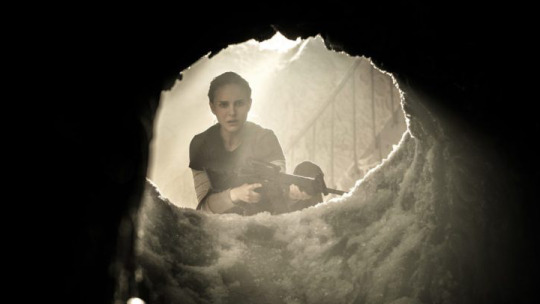
This was my most anticipated film of the year, and my hype for it was more than rewarded. This is a marvellously rich and transporting science fiction film that isn’t afraid of taking the viewer to some very weird places. However, Annihilation doesn’t simply rely on its strangeness to succeed - it is also firmly rooted in its characters and themes, which has made it incredibly rewarding to return to. Natalie Portman is fantastic as Lena, and Annihilation is a brilliant showcase for her - Lena is a complex and frequently self-destructive character, riddled by guilt and regrets that shape the pulsating, luminescent world of the mysterious ‘Shimmer’ that she has to venture into. The Shimmer might seem like an environmental phenomenon at first, but it’s really more psychological, being a space that adapts according to the people who enter into it. This film overflows with fascinating and thought-provoking ideas, and it was entirely worth the hike I made over to Brooklyn to catch one of the final showings at the theatre (since Annihilation was denied a theatrical release in the UK, I made a point of seeing it while I was on holiday in New York). I think it will go down as one of the great science fiction films, and it belongs in the same conversations as 2001: A Space Odyssey and Solaris.
2. Beast, dir. Michael Pearce
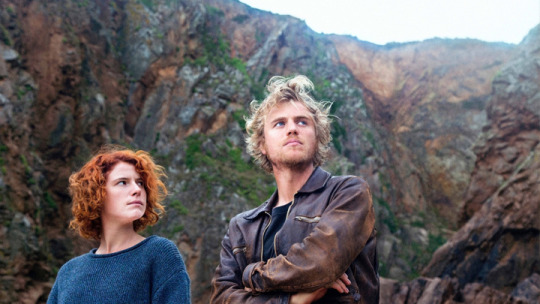
This little British film - shot mostly on location in Jersey by a first-time director - was easily the biggest (and best) surprise I’ve had so far at the cinema this year. I literally had no idea this film existed until a day or so before I watched it, and that made the experience of viewing it even more wonderful. Moll (Jessie Buckley) is an isolated young woman who is stifled by her controlling family and quiet life on a remote island, as well as a secret sin that bubbles away underneath the surface. Her life is predictable - safe, repetitive and dull - until she meets Pascal, a mysterious local man who she finds she has an affinity with. However, there is a murderer haunting the island, taking the lives of young girls in the night. Who’s to blame, and what impact will the killings have on Moll and Pascal’s swiftly escalating romance? While that is a synopsis more than a review, I felt it necessary to explain the premise to try and compel you to seek this one out. Beast is raw, woozy and utterly absorbing - the love story between Moll and Pascal is one of the most passionate and gripping you’ll ever see on screen, and their chemistry is simply sensational. There’s a real gothic, fairy-tale edge to the story which appealed perfectly to my (admittedly rather niche) tastes. This is a real hidden treasure of a film - do yourself a favour and make it your mission to watch it.
3. Lady Bird, dir. Greta Gerwig
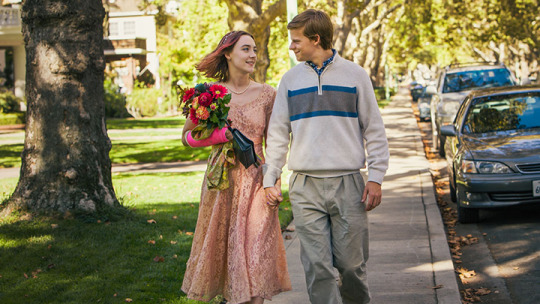
This film was so, so relatable, despite my not really having experienced an adolescence anything like “Lady Bird’s”. While the details of her life are very different from mine, I think anyone can relate to the sweeping brushstrokes - the tensions that can arise between parents and children, the thirst for freedom and independence that builds the closer you get to the final days of school, and the feelings of love and loyalty that are always there even when they’re unspoken. Greta Gerwig captures all of this and so much more with marvellous delicacy, balancing little moments that add colour and spark with more serious scenes so deftly that it’s amazing to think that this is her first feature. Lady Bird is a very specific and very beautiful film, and it’s special precisely because it feels universal even as it feels small and personal to its director.
4. Eighth Grade, dir. Bo Burnham

This is the perfect double bill with Lady Bird, and the people who have dubbed this film “Lady Bird Jr” are right on the money. Elsie Fisher has a real star turn as the heroine Kayla, who is a very special child - she’s kind, sensitive and thoughtful, which basically means she’s my kind of superhero. But even as she is a good and sweet person, she is also going through all of the trials you’d expect a 13 year old to be facing in 2018, as she wrestles with acne, confusing feelings about super-dreamy boys, and the escalating anxiety that comes with a comment-free Instagram post. Like Lady Bird, this film succeeds in being both very specific and highly universal - the only social media I had to deal with as a teen were MySpace and Bebo, and I found that seeing Kayla wrestle with a whole kaleidoscope of feeds, devices and platforms made her strong grip on her integrity as a funny and deeply warm-hearted individual all the more remarkable. Bo Burnham, as with Gerwig, made a pretty incredible film here - in particular you should watch out for the father/daughter dynamic, which is my favourite part. Eighth Grade is funny and generous, and the perfect medicine if you’re feeling demoralised by the state of the world right now.
5. The Breadwinner, dir. Nora Twomey
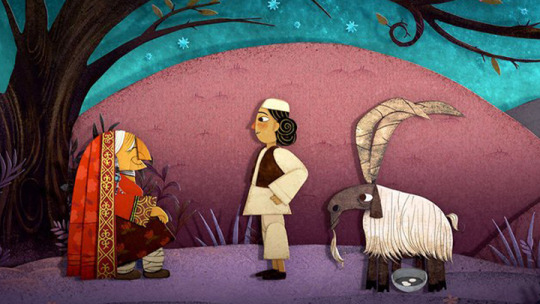
The Breadwinner is a really lovely animated film telling the story of Parvana, a young girl living with her family under the Taliban. When her father is taken off to prison, Parvana sees no other choice but to dress as a boy to provide for her mother and siblings. But how long will her disguise last? The story here was what really gripped me - it’s very simple, in both the telling and the themes, but it is truly beautiful in that simplicity. The emotions are very raw, and this film goes to some shockingly dark places at times - while I think it can be watched with children as long as they are mature enough for some challenging themes and upsetting moments, it’s likely to speak most strongly to adult audiences with a fuller appreciation for the context in which the film is set. It’s a great and moving alternative to more mainstream animated efforts, and is well worth your time.
6. Phantom Thread, dir. Paul Thomas Anderson

This was a delightfully twisted film with an absorbingly complicated and twisty relationship at its centre. Vicky Krieps is an absolute marvel as Alma, and it’s wonderful to see how she battles to bring the fragile and austere designer Reynolds Woodcock (Daniel Day-Lewis) to heel. It’s also a beautiful film with rather fabulous fashions - if you love couture, particularly from the ‘50s, this will be a real treat. I also appreciated the many allusions to classic cinema - there are strong shades of Hitchcock’s Rebecca, as well as the underrated David Lean film The Passionate Friends. Check this out if you like your romantic dramas weird and entirely unpredictable.
7. Revenge, dir. Coralie Fargeat

Revenge is angry, sun-soaked and batshit insane - and it is pretty great for all of those reasons. It follows Jennifer, the teenage mistress of a sleazy married man. After a horrifying assault Jennifer returns, phoenix-like, to wreak her revenge upon her attackers. This movie was very much inspired by exploitation flicks, with their penchant for showing scantily clad (and frequently bloody) women wielding shotguns to hunt down the brutes who did them wrong. However, first-time director Coralie Fargeat takes every one of those tropes and owns them, ramping up the blood and giving the action a propulsive energy that keeps you gripped even as you know exactly where things are going. The soundtrack here is also one to look out for - it’s all pulsating synths that do a great job of building the suspense and tension from the get-go.
8. Lean on Pete, dir. Andrew Haigh
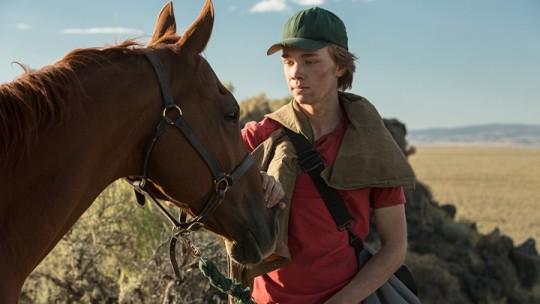
This is a very painful film in many ways, but it’s only painful because it does such a great job of earning your emotional investment. The lead of this film is Charley, a sensitive and quiet teenage boy who becomes attached to an ailing race horse as he seeks to escape his troubled home-life. When he finds himself in crisis, Charley takes the horse and they head off on a journey across the American heartland. Charlie Plummer is extraordinary as the lead here - Charley is the kind of character that makes you want to reach through the screen so you can offer him a hug of reassurance and support. The photography of the American countryside is exquisite, and means this film really deserves to be seen on the big screen - the breadth of the landscape gives all of the emotional drama some (richly deserved, in my view) extra punch.
9. You Were Never Really Here, dir. Lynne Ramsay
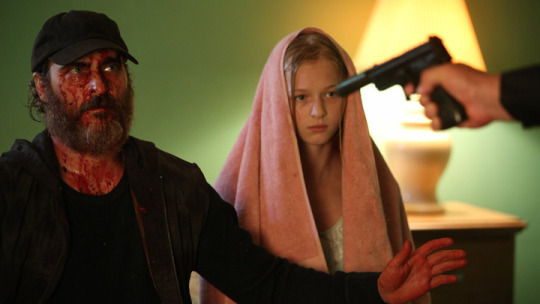
This is a very weird film (you’re probably noticing a theme at this point) but it’s completely absorbing. It’s very much actor-led, and the film rests on the shoulders of Joaquin Phoenix’s gripping and unpredictable performance - in some scenes he’s muttering in deference to his mother like a modern-day Norman Bates, while in others he’s portrayed almost as a lost boy in an overgrown body, disorientated by his environment and engaging in acts of extreme violence as if in a sort of trance. The narrative is fuzzy and unfocused, but I didn’t find that mattered much since I was too busy following every evolution of Phoenix’s face.
10. Thoroughbreds, dir. Cory Finley
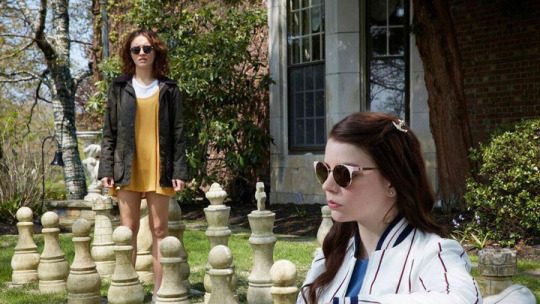
Olivia Cooke and Anya Taylor-Joy make fantastic foils to one another as two appallingly privileged teenagers whose obscene wealth is only matched by their resounding lack of morals. This is a film that plays with your loyalties, trying to wrong-foot you at every turn - it’s frequently difficult to figure out what’s genuine here, and while that did sometimes leave me feeling a bit emotionally detached that’s usually the point. This film is more of an intellectual puzzle than a lean, mean, emotion-extracting machine (see: Lean on Pete), and it succeeds brilliantly on that level. The simplicity of the story means the fun lies in picking apart lines and expressions, so go in prepared for some close viewing.
#annihilation#films#cinema#movies#list#movie recs#beast#lady bird#lean on pete#the breadwinner#phantom thread#Eighth Grade#you were never really here#thoroughbreds
369 notes
·
View notes